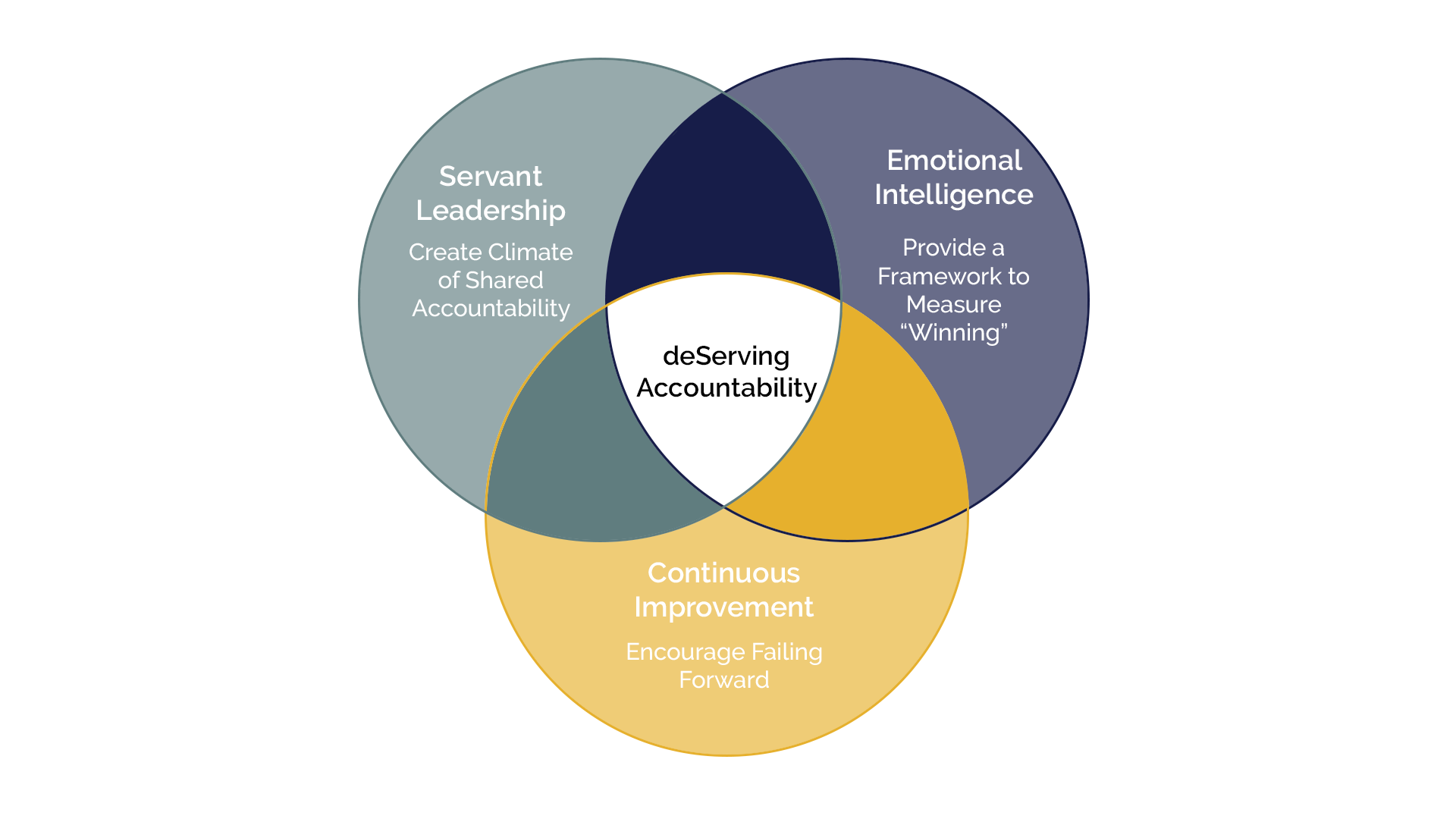Accountability vs. deServing Leadership
One of EVENTEQ’s core values is Accountability. We define it as, “We take ownership of our actions and results by honoring our promises, commitments & decisions — while understanding our roles and responsibilities.”
We recently had to terminate an employee who had more than one negative encounters with other employees. This brought to light one of the biggest questions I often get asked — how can you serve people and yet hold them accountable at the same time?
What is often lost when you focus on servitude is the idea that it goes hand in hand with leadership — and leadership involves setting the direction for others to follow. All leaders are always accountable for their results. If deServing leadership is truly centered around the idea that servitude is a pre-requisite to be a leader and using emotional intelligence to positively engage those around you is necessary to serve — then the truest measure of deServing leadership is whether those you serve grow as people, while being served, and become healthier, wiser, freer, more autonomous, more likely themselves to be servants?
All organizations have to set goals that provide direction to those within. And goals are only as good as their ability to be measured. In today’s interconnected organizations like the audio-visual business, every individual’s performance impacts those around them, processes and the organization as a whole. Everyone from sales, labor and equipment logistics, transportation, technical, warehouse and support staff are equally important to the success of a show. Holding them accountable is perhaps the highest form of servitude to those around them. Individual contributors are accountable for their tasks or processes, leaders are accountable for their teams and the organizations are responsible for the community (clients/vendors/freelancers/partners) it serves. In order for these to align and for all of these parties to serve each other, accountability helps tie it all together. And when it all comes together, then the organization inherently becomes a servant organization with deServing leaders at its core.
I think the difference between accountability from a servitude filter vs. the generally accepted norms of accountability is blame. Looking at accountability through the filter of servitude & emotional intelligence — it starts to become about helping align your colleagues with the ideal opportunities for them rather than about disciplining them. It means taking responsibility for results, good or bad. It means finding solutions to problems and applying lessons learned in order to improve future results. Blame just makes people get better at hiding their mistakes. Most workplace problems and accidents are blamed on human error when they are usually caused by a combination of factors including flawed systems or processes.
Holding others accountable through the servitude filter by positively engaging them in the process can make accountability an enjoyable experience. If accountability is seen as a mutual discovery process, then each person is recognized as highly important to the process before it begins. High self esteem is continually nurtured. In fact working collaboratively is the best way to positively engage your team’s emotions since they each get what is personally important to them. If this happens, not only do these primary partners win, but they in turn positively engage the emotions of customers, families, team mates and community.
Everyone knows “ what gets measured gets done”. When employees know things are getting done in clear, measurable ways, they feel like they are winning. There is no better way to positively engage their emotions than to make them feel like they are winning. By becoming accountable to ourselves and our team members in all directions, we signal a new level of shared trust and interdependence. Strength through difference begins to take root. In a punishment/reward mindset, accountability is a have to. It is almost always reactive and one-sided, looking back on the performance of one person by another. But accountability from a servitude mindset ensures this process flows daily, as partners create shared goals, celebrate shared accomplishments and harvest new knowledge. This also enables continous improvement. Each so-called failure is an opportunity to fail forward. Failing forward entails learning from your mistakes and using them as stepping stones for success. For a deServing leader centric organization to be truly successful, any team mate can and should be able to hold others accountable because it’s rewarding and safe to measure progress, celebrate, recalibrate and learn from mistakes. Identifying problems early brings valuable lead time for all.
As Stephen Covey famously said, “Accountability breeds response-ability.” A Servant leader must serve those around them by holding them accountable because it teaches them to make the decisions in the moments that matter the most. If you can also teach them how to do so in a positively engaging manner — you inherently have served them, positively engaged them and empowered them to do so independently in the future. That is the epitome of being a deServing Leader.


